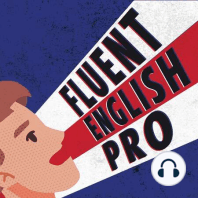17 min listen

Is translating good for learning English vocabulary? Probably not, and this is why
Is translating good for learning English vocabulary? Probably not, and this is why
ratings:
Length:
21 minutes
Released:
Sep 19, 2023
Format:
Podcast episode
Description
Have you ever wondered why teachers don’t recommend using translation for learning English? Are there words or expressions that we can’t accurately?In this episode, we delved into the intricacies of language translation and its limitations for learning English as a foreign language. While some of the words might be translated literally, the cultural nuances, emotions, and historical contexts they carry often remain elusive in translation. We explore examples like "estrenar" in Spanish, a word that signifies wearing something for the first time, along with the concept of "el sereno," which embodies a chilly night breeze in Colombia. These examples highlight the challenge of capturing the cultural layers of meaning in different languages. Moreover, we discuss the struggle to translate terms like "homesick" or sensitive expressions that carry racial implications, showcasing the difficulties faced by translators.We discovered that translation can be a double-edged sword. While it can help convey basic meanings between languages, it often falls short when attempting to transmit the deep-rooted emotions and cultural connotations attached to certain words and expressions. The episode highlighted the gap between the literal translation and the underlying cultural and emotional dimensions.The key lesson here is that language is more than words—it's about cultural context, history, and emotions. Relying solely on translation tools can hinder true understanding and effective communication. A balanced approach, including learning in context and appreciating the unique facets of a language, is essential for genuine language proficiency.Key Takeaways: Translation struggles to capture cultural nuances and emotional depth. Certain words and expressions have no direct equivalents in other languages. Language learning is more than just vocabulary—it's about embracing the cultural essence.
Avoid direct translations from english to spanish. 0:06
Words and expressions that cannot be translated into English. 3:50
One word in spanish for example can have multiple translations into English.5:15
Will we ever be able to tell a human translation from a computer generated :translation? 7:10
Examples of things that can and cannot be translated from Spanish to English. 9:15
A cultural thing, too. 11:30
The use of words like spoiler in Spanish. 13:10
Translating words in spanish. 15:30
Bridging Vocabulary Gaps, but Context is Key for Non-Verbal Communication. 18:20
Avoid direct translations from english to spanish. 0:06
Words and expressions that cannot be translated into English. 3:50
One word in spanish for example can have multiple translations into English.5:15
Will we ever be able to tell a human translation from a computer generated :translation? 7:10
Examples of things that can and cannot be translated from Spanish to English. 9:15
A cultural thing, too. 11:30
The use of words like spoiler in Spanish. 13:10
Translating words in spanish. 15:30
Bridging Vocabulary Gaps, but Context is Key for Non-Verbal Communication. 18:20
Released:
Sep 19, 2023
Format:
Podcast episode
Titles in the series (30)
Mastering English: How to Boost Listening Skills with Podcasts and Audiobooks by Fluent English Pro